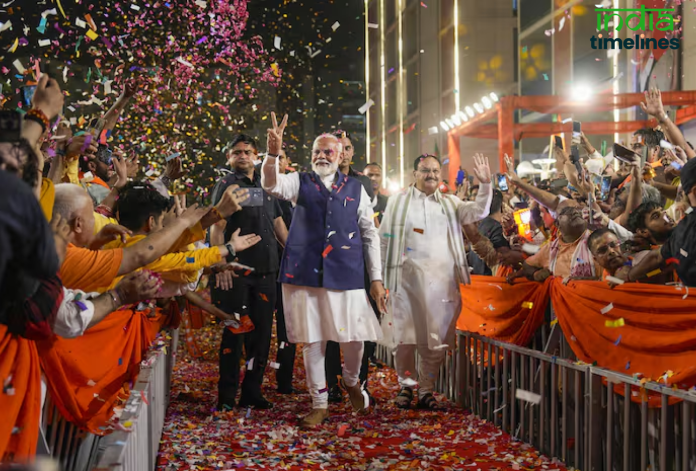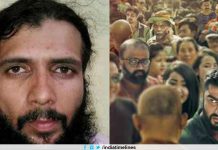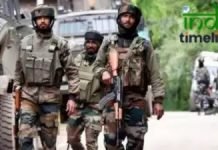
NEW DELHI (AP) — Prime Minister Narendra Modi proclaimed victory for his alliance in India’s general election, asserting a mandate to continue his policies despite his party losing seats to a stronger-than-expected opposition. This opposition has been critical of his economic performance and divisive politics.
“Today’s victory is the triumph of the world’s largest democracy,” Modi declared to a crowd at his party’s headquarters on Tuesday. He emphasized that Indian voters had “shown immense faith” in both his party and the National Democratic Alliance (NDA) coalition.
Election Results and Coalition Dynamics
Official results from India’s Election Commission on Wednesday revealed that the NDA secured 294 seats, surpassing the 272 needed for a majority but falling short of expectations. This election marks the first time since Modi’s Bharatiya Janata Party (BJP) came to power in 2014 that it did not achieve a majority on its own, winning only 240 seats—significantly fewer than the 303 seats in the 2019 election.
Modi will now rely on coalition partners to govern, a surprising development for the 73-year-old leader who anticipated a sweeping victory. During the campaign, Modi predicted his party would win 370 seats, with allies contributing another 30.
Key allies include the Telugu Desam Party in Andhra Pradesh with 16 seats and Janata Dal (United) in Bihar with 12 seats, among other smaller groups.
Voter Sentiment and Opposition Gains
Indian voters can’t be taken for granted,” stated an editorial in the Times of India. “The economic message from the results is that jobs matter.
The Congress party improved its standing by winning 99 seats, up from 52 in the 2019 elections. Key allies like the Samajwadi Party secured 37 seats in Uttar Pradesh, the All India Trinamool Congress won 29 seats in West Bengal, and the Dravida Munnetra Kazhagam gained 22 seats in Tamil Nadu. The opposition INDIA coalition won a total of 232 seats.
Coalition Politics and Leadership Challenges
Milan Vaishnav, director of the South Asia Program at the Carnegie Endowment for International Peace, noted that the BJP may now heavily depend on the goodwill of its allies, who will likely demand significant influence in policymaking and government formation.
Political commentator Pratap Bhanu Mehta remarked, “At the very least, the result pricks the bubble of Prime Minister Modi’s authority. He made this election about himself. Today, he is just another politician, cut to size by the people,” he said in an article in The Indian Express.
Massive Voter Turnout and Economic Concerns
Over 640 million votes were cast during the six-week-long election, the largest democratic exercise in the world.
Despite the BJP’s reduced support, opposition parties claimed a moral victory. Congress party President Mallikarjun Kharge said, “This is the public’s victory and a win for democracy.”
Modi vowed to deliver on his promises to elevate India’s economy to the world’s third largest from its current fifth place and to continue advancing his agenda. His plans include boosting defense production, creating jobs for youth, increasing exports, and supporting farmers.
“This country will see a new chapter of big decisions. This is Modi’s guarantee,” he stated, speaking in the third person.
Historical and Global Reactions
Modi’s win marks only the second time an Indian leader has secured a third term, the first being Jawaharlal Nehru. Before Modi, India experienced 30 years of coalition governments.
Leaders from neighboring Nepal and Bhutan, among others, congratulated Modi, while the White House praised India’s “vibrant democratic process.”
Modi’s Decade in Power
In his decade-long tenure, Modi has reshaped India’s political landscape, bringing Hindu nationalism into the mainstream but also deepening divisions within the country.
Supporters view Modi as a self-made, strong leader who has elevated India’s global standing. Critics argue that his Hindu-centric policies have fostered intolerance and increased economic inequality.
Voices from the Public and Opposition
For Payal, a resident of Lucknow, the election was about the economy and widespread poverty. “People are suffering, there are no jobs, people are in such a state that their kids are compelled to make and sell tea on the roadside,” Payal expressed. “This is a big deal for us. If we don’t wake up now, when will we?”
Rahul Gandhi, a leading figure in the Congress party, interpreted the election results as a message from the people. “The poorest of this country have defended the constitution of India,” he said at a news conference.
Election Campaign and Criticisms
Modi’s popularity has often surpassed that of his party, transforming the parliamentary election into a campaign that resembled a presidential race, with the BJP heavily relying on his personal brand.
“Modi was not just the prime campaigner, but the sole campaigner of this election,” noted public policy scholar Yamini Aiyar.
Critics accuse Modi’s government of undermining democracy through tactics that suppress political opponents, constrain independent media, and stifle dissent. The government denies these allegations, insisting that democracy is thriving.
Economic dissatisfaction persists, with record-high stock markets contrasting sharply with high youth unemployment and uneven economic benefits.
Initially, the BJP’s confident campaign focused on “Modi’s guarantees,” emphasizing economic and welfare achievements. However, as the campaign progressed, Modi resorted to polarizing rhetoric targeting Muslims, energizing his Hindu majority base.
The opposition INDIA alliance criticized Modi’s Hindu nationalist politics and campaigned on issues of joblessness, inflation, and inequality. “These issues have resonated and made a dent,” Aiyar concluded.

































